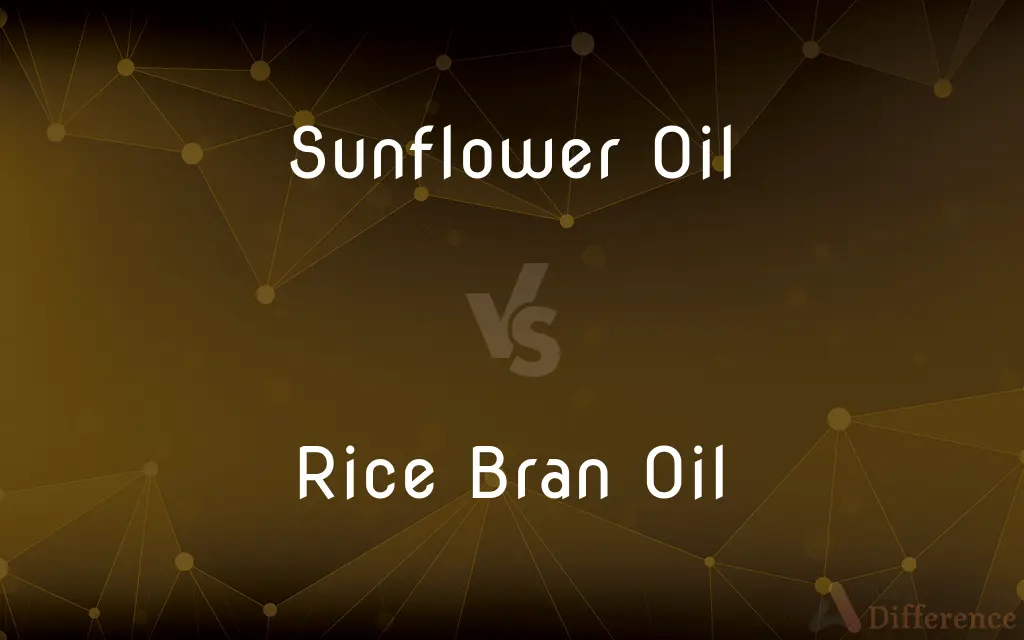Sunflower Oil vs. Rice Bran Oil — What's the Difference?
By Tayyaba Rehman — Published on November 27, 2023
"Sunflower Oil" is oil extracted from sunflower seeds, known for its light taste and health benefits, while "Rice Bran Oil" is oil extracted from the hard outer layer of rice, noted for its high smoke point and rich nutrients.

Difference Between Sunflower Oil and Rice Bran Oil
Table of Contents
ADVERTISEMENT
Key Differences
"Sunflower Oil" is derived from the seeds of the sunflower plant, offering a light texture and mild flavor that doesn't overpower dishes. It is often used in cooking for its high content of polyunsaturated fat, specifically linoleic acid, which is a type of omega-6 fatty acid. On the other hand, "Rice Bran Oil" comes from the outer layer of the rice grain, known as the bran. This oil is celebrated for its versatile culinary uses due to its high smoke point and rich nutritional profile, including antioxidants such as vitamin E and oryzanol.
In terms of health benefits, "Sunflower Oil" contains a substantial amount of vitamin E, which acts as an antioxidant and is good for skin health. However, it's essential to balance its consumption with other fats, as a high intake of omega-6 fatty acids can lead to inflammation if not balanced with omega-3 fatty acids. Conversely, "Rice Bran Oil" has been associated with various health benefits, including lowering cholesterol levels, improving heart health, and providing anti-inflammatory properties due to its components like oryzanol and tocotrienols.
When it comes to cooking, "Sunflower Oil" is prized for its frying capabilities, especially due to its high smoke point, which prevents harmful compounds from forming during high-heat cooking. In contrast, "Rice Bran Oil" also possesses a high smoke point, making it ideal for stir-frying, deep-frying, and sautéing without breaking down, all while adding a mild, nutty flavor to dishes.
In the market, "Sunflower Oil" is widely available and is commonly used in various products, including margarine, snacks, and ready-to-eat meals due to its stability. "Rice Bran Oil," though increasingly popular, is not as ubiquitous in Western markets but is a staple in Asian cuisine and is often used in the preparation of tempura and other fried foods because of its light, versatile nature.
Speaking from a global perspective, "Sunflower Oil" production is prevalent in countries like Ukraine and Russia, the world's leading sunflower seed producers. In contrast, "Rice Bran Oil" production is more prominent in Asian countries, particularly those with significant rice production like India, Thailand, and Japan, due to the availability of rice bran, a byproduct of rice milling.
ADVERTISEMENT
Comparison Chart
Source
Extracted from sunflower seeds.
Derived from the outer layer of rice grains.
Health Benefits
High in vitamin E; omega-6 fatty acids.
Contains oryzanol; rich in antioxidants.
Use in Cooking
Suitable for high-heat cooking.
High smoke point; good for frying.
Availability
Widely available globally.
More common in Asian markets.
Production
Major producers include Ukraine, Russia.
Common in rice-producing countries (Asia).
Compare with Definitions
Sunflower Oil
Rich in antioxidants, particularly vitamin E
Sunflower oil is a great source of vitamin E for skin health.
Rice Bran Oil
Contains oryzanol, which may help lower cholesterol
My doctor recommended rice bran oil due to its cholesterol-lowering effects.
Sunflower Oil
Suitable for high-heat cooking due to its high smoke point
For deep frying, I always choose sunflower oil.
Rice Bran Oil
Offers a mild, nutty flavor to dishes
The subtle, nutty taste of rice bran oil enhances my stir-fry dishes.
Sunflower Oil
Extracted from the seeds of the sunflower plant
Sunflower oil is my go-to choice for dressings due to its mild flavor.
Rice Bran Oil
Noted for its high smoke point, ideal for frying
Rice bran oil is perfect for high-temperature cooking.
Sunflower Oil
Light in texture and flavor, doesn't overpower dishes
I prefer cooking with sunflower oil as it doesn't alter the taste of my recipes.
Rice Bran Oil
Rich in antioxidants and vitamins
I incorporate rice bran oil into my meals for its health benefits.
Sunflower Oil
Contains high levels of polyunsaturated fats
I use sunflower oil to add healthy fats to my diet.
Rice Bran Oil
Derived from the outer layer of rice grains
I cook with rice bran oil because it's derived from a part of rice that's usually discarded.
Common Curiosities
Is "Rice Bran Oil" suitable for all types of cooking?
Its high smoke point makes it versatile for frying, sautéing, and even baking.
What are the main uses of "Rice Bran Oil" in cooking?
Commonly used for high-heat cooking like frying, and it's a staple in Asian cuisines.
What are the health benefits of "Sunflower Oil"?
It's rich in vitamin E and polyunsaturated fats, though it's best to balance with other fat sources.
Are there any allergens in "Rice Bran Oil"?
It's generally hypoallergenic, though those with specific sensitivities should consult a doctor.
Is "Sunflower Oil" good for your heart?
It's high in polyunsaturated fats, which can be heart-healthy in moderation and when replacing saturated or trans fats.
What makes "Rice Bran Oil" a healthy option?
It has antioxidants, vitamins, and is linked to cholesterol reduction thanks to components like oryzanol.
Does "Rice Bran Oil" have a strong flavor?
It has a mild, nutty flavor that doesn't overpower dishes.
What's the smoke point of "Rice Bran Oil"?
It has a high smoke point of approximately 450°F (232°C).
Can "Sunflower Oil" be used for deep frying?
Yes, it has a high smoke point suitable for deep frying.
Do I need to refrigerate "Sunflower Oil"?
No, but it should be stored in a cool, dark place.
Is "Sunflower Oil" widely available?
Yes, it's commonly found in grocery stores worldwide.
Is "Rice Bran Oil" expensive?
It can be more expensive than common oils, depending on regional availability.
What is the omega-6 content in "Sunflower Oil"?
It's high in omega-6, which should be balanced with omega-3 intake.
Can "Sunflower Oil" go bad?
Yes, like all oils, it can turn rancid, so proper storage is key.
What's the difference in fat composition between "Sunflower Oil" and "Rice Bran Oil"?
"Sunflower Oil" is higher in polyunsaturated fats, while "Rice Bran Oil" has a balance of monounsaturated, polyunsaturated, and saturated fats.
Share Your Discovery

Previous Comparison
Hydrochloric Acid vs. Sulfuric Acid
Next Comparison
Twin Room vs. Double RoomAuthor Spotlight
Written by
Tayyaba RehmanTayyaba Rehman is a distinguished writer, currently serving as a primary contributor to askdifference.com. As a researcher in semantics and etymology, Tayyaba's passion for the complexity of languages and their distinctions has found a perfect home on the platform. Tayyaba delves into the intricacies of language, distinguishing between commonly confused words and phrases, thereby providing clarity for readers worldwide.












































